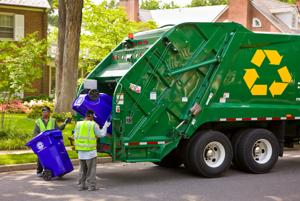Op-Ed: Environmental and economic victories matter to all Virginians

A clean environment matters to us all. Sometimes the legacy media and certain politicians pretend that only they or their allies care about the environment. But the truth is Americans of all walks of life and all political persuasions care about clean air, clean water and clean soil.
I’m a known conservative and a native Virginian, and I too care about the environment. Unfortunately, some, for political reasons, pretend that only they care about the environment and all too often that only their ideas and policy choices are good for the environment. This, of course, is a logical fallacy. Virtually everyone agrees that the environment matters, but we do have differences about how best to achieve that important goal.
Last week, Virginia Gov. Ralph Northam signed into law S.B. 1164, which provided that advanced recycling will no longer be considered solid waste management. With the General Assembly’s efforts focused on recycling, it would have been a great time to consider minimum recycled content standards as well.
Many in the media fail to mention that because the United States has a strong market-based economy, we have the wealth needed to care about the environment. If we lived in a third world nation where survival was a real question, where finding basic food and shelter for ourselves and our family was very difficult, we would worry about more immediate and pressing concerns than what the environment might look like in 10 years. Our concerns would be about how to feed our family today or tomorrow and how to make it through the winter.
But America’s relative wealth has made it the most pro-environment nation on the planet. Even during an impressive economic expansion and an American energy Renaissance in the years leading up to the COVID-19 pandemic, we were able to do more to meet carbon dioxide reduction goals than any other country on Earth. Simply stated, America’s market-based economy has made us more concerned with the environment and made it easier for us to afford to do things that matter.
Thus, whatever we as Virginians do to protect the environment, we should also ensure our economy stays strong. The choice shouldn’t be between a clean environment and a strong economy. We can, and must, have both. Furthermore, the truth is that the poorest nations have the most serious environmental problems. Wealth and economic success allow us to not only care about the environment, but to also take steps to keep it clean.
Similarly, we also have to admit that some companies, in a short-sighted bid to save a penny here or there, will make decisions that harm the environment and provide no discernable benefit to consumers. The vast majority of Virginians see the value of recycling things like aluminum cans and plastic bottles and containers – and in fact undertake measures to do so. But some short-sighted companies believe in using raw – instead of recycled – materials to make bottles and containers and then burying them after they’ve been used once, even though the cost to the broader society is considerable. Consequently, Virginians agree by overwhelming majorities that certain items like cans and bottles should have minimum recycled content standards.
Given that we are creating ever higher amounts of solid waste and trash, and that not all of it can be composted back into the earth, reasonable minimum recycled content requirements for plastic bottles and containers make a lot of sense. It reduces the demand for the raw materials that make an item and at the same time reduces the amount of reusable materials buried in landfills.
Reasonable minimum recycled content standards would ensure that a great deal more recyclable materials are, in fact, recycled. At the same time, setting goals and standards for recycling without dictating the precise procedures or processes or approaches allows the dynamism of the marketplace to figure out precisely how to accomplish those goals. This sort of dynamic system encourages entrepreneurship and creativity in solving our solid waste problems and leaves room for the marketplace to figure out the best and most cost-effective ways to recycle plastics.
This sort of light-touch regulation helps the environment and at the same time, does not hamstring our economy. And on top of that, such an approach would harness the strength and boldness of a robust marketplace to create an economy that builds durable recycling markets. That would mean less raw materials wasted and less plastics buried in our landfills. We will all benefit from such an approach.
Some suggest other more burdensome and costly approaches. But they will do nothing more for the environment, and probably a great deal less, and the more heavy-handed approach will likely do economic harm as well. That’s the effectiveness of a wisely crafted minimum recycled content approach – it will give us significant environmental benefits, ones we will all enjoy and find valuable – without imposing burdensome economic costs on consumers. That is a win-win!
Disclaimer: This content is distributed by The Center Square

